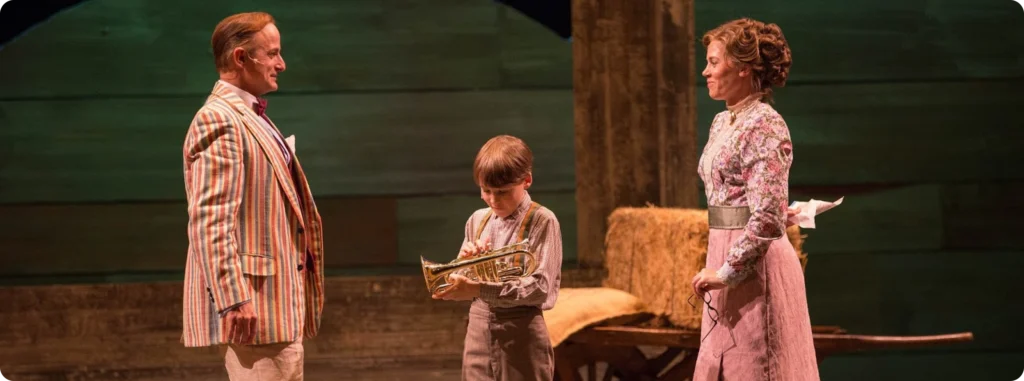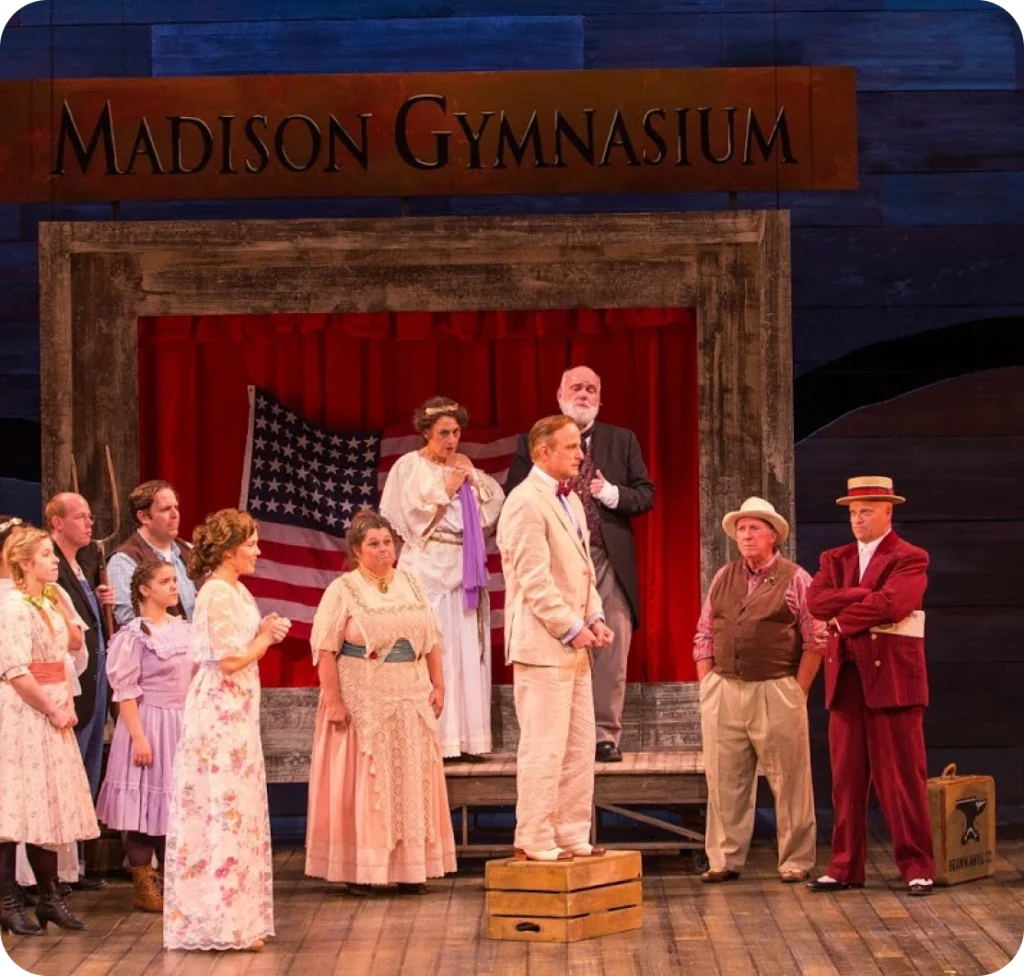Long before Lin-Manuel Miranda made spoken word (aka hip hop) the hottest trend on stages anywhere, Meredith Wilson penned the iconic opening number of The Music Man (quoted above), where a peck of salesmen jostle on a “train” while sitting on their sales suitcases. The salesmen gossip as they sit in this simple staging, their words wringing together into a deftly musical number that turns elongated vowels into notes and texturizes the sound of the show.

The rhythmic opening leads straight into a theatrical time capsule full of unexpected wit and charm, and it holds up surprisingly well in a new production at Artistry in Bloomington. While a story about a con man who hoodwinks an entire community into giving him money and power with a wink and a smile might be just a bit cringe-worthy these days, The Music Man has a sunny smile to share that will give you hope for a way out of our current political mess.

The Music Man tells the story of Harold Hill, a traveling salesman who is more con artist than businessman. Hill traverses the United States selling instruments and uniforms to form a boy’s band in small towns, leaving the second the payments come through without actually teaching the kids to play. His devious approach to sales leaves a scorched earth environment for the salesmen who follow him, and his reputation precedes him on a journey through Iowa. The people of Iowa are notoriously stubborn and difficult to pitch to, so Hill decides to tackle the challenge. He is ultimately successful in forming a boy’s band, but not before serious investigation from townfolk who are determined to find out Hill’s true motivations and past. Along the way Hill falls in love with the town librarian Marian Paroo, his fiercest critic who becomes his fiercest advocate. He also unites the city council into a barbershop quartet; herds the town gossips into a rousing rendition of incessant chatter entitled “Pick-a-Little, Talk-a-Little;” and brings the joy of music and imagination to a community starved of both.
It’s somewhat amazing that this show is as charming and positive as it is, considering the fact that Hill is horrifyingly selfish, manipulative and narcissistic. Some of Hill’s overtures to Marian are downright rapey (witness the musically delightful but politically cringe-worthy “Marian the Librarian”), and it’s easy to see how his reputation might be in trouble
And yet…. there is so much joy in these lighthearted songs such as “76 Trombones,” “Goodnight My Someone” and “Ya Got Trouble”; despite Hill’s manipulation the townfolk are so much happier by the end; and it’s so fun to see a bunch of stuffy old Midwesterners loosen up; that you can quickly forget the less savory parts of the script as it unfolds.
Artistry’s production is quite successful, thanks to primarily to the tireless work of Michael Gruber, who stars as Harold Hill and also orchestrated the choreography. One of the best parts of this show is the cast’s nimble footed dancing, and there is never a moment where the blocking hasn’t been considered. Gruber has done wonders in arranging this cast, and it translates through to his performance as well. Gruber isn’t the best singer of the bunch, but he doesn’t need to be. His assured, suave physicality thoroughly encapsulates Hill’s unfettered self-confidence, and Gruber’s graceful delivery has a Gene Kelly quality that is thoroughly appealing. He is perfectly paired with Jennifer Eckes as a radiant Marian Paroo. Eckes has a gorgeous voice that anchors the cast’s musicality, and the two of them light sparks all over the place as the action continues.
The whole cast does a great job. Notable standouts include Wendy Short-Hays with a hilarious portrayal of Eulalie Mackecknie Shinn, the mayor’s wife; Liam Beck-O’Sullivan is utterly charming as the lispy, adorable Winthrop Paroo; Lolly Foy wields the best Irish accent I’ve ever heard on stage as Marian’s mother Mrs. Paroo; and France Roberts aims a beaming smile that blazes straight through the audience as Hill’s friend Marcellus Washburn. Elly Stahlke does a great job leading the dance efforts as Dance Captain, and Anita Ruth leads the pit orchestra with a firm hand. The musicians really set the pace for the whole show, and they did a great job of keeping up with the action on stage.
The scenic design from Joel Sass shares interesting qualities with this summer’s Sunday in the Park with George at the Guthrie. Here we also have a fixed, floating portrait frame and pointillated lights. This production utilizes far more props and small set pieces around these elements, such as a revolving ladder, librarian’s desk, front porch door and the infamous kissing footbridge. The effect is enough to keep the action quickly moving yet provide a surprising amount of detail, and it places us squarely in early 20th century Iowa. I also enjoyed the dynamic costumes from Ed Gleeman, who keeps the production deeply rooted in tradition. The fashion is colorful and evocative, and it perfectly suits the story.
summer’s
The Music Man has so many surprising ties to the darker sides of our political arena today – manipulation, falsehood, harassment, crowd mentality, gossip. However, through its lighthearted delivery The Music Man makes these issues seem surmountable. We learn that not everything needs to be taken so seriously; sometimes we need to be tricked into seeing life a little differently; and happiness can be more important than steadfast decorum. Even the worst among us are capable of doing good things, and it behooves us to find that good in each person as often as we possibly can.

Artistry’s lovely performance of The Music Man is sadly nearly sold out, but if you can manage to get a ticket before they close on November 5 I definitely think you should. For more information about the production, click on this link.